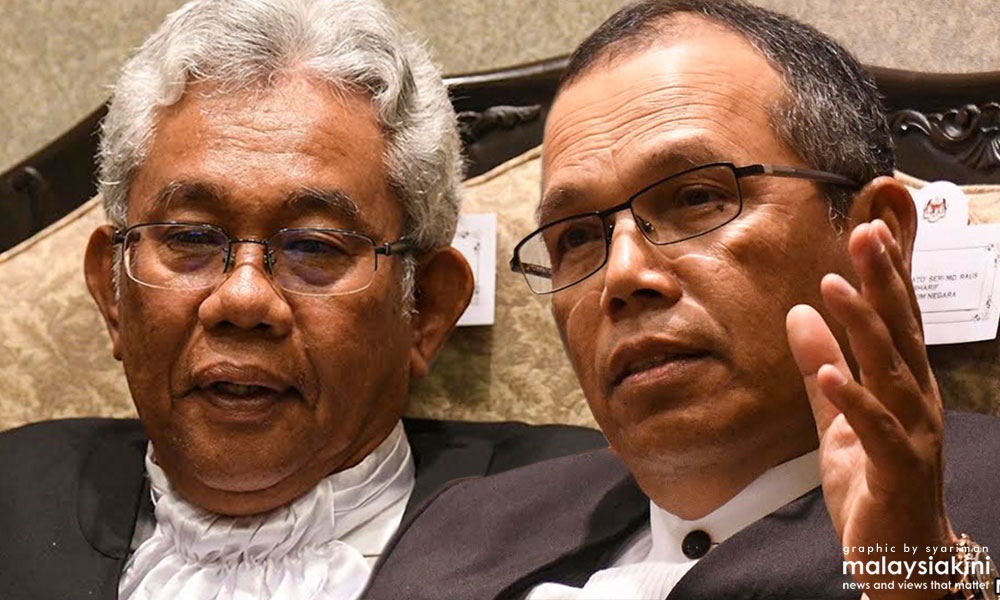
One index that shame is alive and well is the frequent appearance of press photographs of the accused, following their arraignment in the courts, emerging from their ordeal for that brief walk to the waiting Black Marias, cowering and hiding their faces with the upper part of the garments they are wearing.
That it's an excruciating moment for them is obvious from the physical contortions they are willing to subject themselves to avoid what for them, clearly, is the shamming glare of publicity.
These are the reactions of some Malaysians enmeshed in situations where they are accused of actions considered violations of laws clearly phrased.
But what about the reactions of other Malaysians, more loftily perched on society's totem pole, who are indelicately placed in situations that might be seen to be in violation of rules, which though not comprehensively and carefully phrased, are there in the Federal Constitution for the protection of values felt as paramount for the health of civil society?
Back in the 17th Century, Hugo Grotius, the father of modern international law, quoted with approval the advice which Euripides, famed dramatist of classical Greece, put in the mouth of Agamemnon addressing Pyrrhus in Trojan Woman: “What the law does not forbid, then let shame forbid.”
Though his theories on the rise and fall of civilizations have lost their traction in academia, the British historian Arnold Toynbee's dictum – “Civilizations (read societies) die from suicide, not from murder” – continues to be regarded as salient about the human condition.
When Toynbee's conclusion is seen together with his theory of how civilizations wax and wane, to wit, that a society's fate depended on how its elite responded to the challenges posed within it, you could infer that the state of this delicate subject called 'shame' is a matter of overriding importance to the health of a polity.
'That shameful episode'
Hence the resort to the phrase – “that shameful episode” – by Mohd Suffian Hashim, head of the country's judiciary from 1974 to 1982, when he described the removal of one of his successors, Salleh Abbas, in 1988.
 To Suffian, there could have been no other word to describe the manner of the impeachment of Salleh (photo).
To Suffian, there could have been no other word to describe the manner of the impeachment of Salleh (photo).
Of the several shameful aspects of that saga, Suffian would have found the chairing of the tribunal which removed Salleh by the man who stood to gain from it, the most cringe-worthy.
But judge Hamid Omar, who was subsequently promoted to the position vacated by the impeached Salleh, held that his appointment as chair of the tribunal that removed Salleh was at the King's behest and, as such, he could not but obey the royal summons.
Hamid would have found the ethos behind Thomas More's response to similarly conflicting imperatives – “I am His Majesty's loyal servant but God's first” – alien.
The submission to a higher summons in preference to one that might save one's bacon, sometimes even one's life, is bound up with the notions of duty, honour and country, notions having to do with that delicate matter: shame.
Our top judicial officer, Md Raus Sharif, is unabashed in maintaining that his reappointment as chief justice, although he had already reached the mandatory age of 66 years and six months, is constitutional.
How charged a field the law is
Chief Justice Raus and the president of the Court of Appeal, Zulkefli Ahmad Makinuddin, have been reappointed to the positions they held before they reached the mandatory retirement age of 66 years and six months, by way of appointment as additional judges of the Federal Court.
Raus' defence of his reappointment, which he argued was done in accordance with the due process of the law, reminds one of how charged a field the law is.
The law may begin in principles but it may end in interests. Its principles may be traduced by interests and its interests may be disguised as principles.
The famous American jurist Oliver Wendell Holmes grasped this light and dark side of the law when he declared: “If want to know the law and nothing else, you must look at it as a bad man, who cares only for the material consequences which such knowledge enables him to predict; not as a good one, who finds his reasons for conduct, whether inside or outside of it, in the vaguer sanctions of conscience.”
The “vaguer sanctions of conscience” is a reference ineluctably bound up with the sense of shame and its concommitant notion: honour.
Raus' defence of his reappointment is bereft of any hint of the “vaguer sanctions of conscience”.
For a feel of this necessitous, if nebulous, concept undergirding civil society, it may be useful to end with an episode concerning the man who coined the phrase.
Holmes, thrice wounded in the American civil war, was past his 90th birthday and 30th year as an associate justice of the Supreme Court when Chief Justice Charles Evans Hughes paid him a visit at his home. Supreme Court judges enjoyed lifetime tenure.
Work had been a kind of religion for the existentialist Holmes, whose brilliant opinions, particularly in the third decade of his tenure (1902-1932) on the apex court, made him its leading light.
Hughes had seen the signs of incipient infirmity in the nonagenarian when he decided to call at Holmes' house to ask him to retire.
He was weeping as he asked; there was immediate assent to the request. They had enacted a tableau whose hallmarks lay in that phrase of which there's nary a hint in Raus' defence of his reappointment.
The future is tenuous, for shame is on our precincts.
TERENCE NETTO has been a journalist for more than four decades. A sobering discovery has been that those who protest the loudest tend to replicate the faults they revile in others. - Mkini



No comments:
Post a Comment
Note: Only a member of this blog may post a comment.